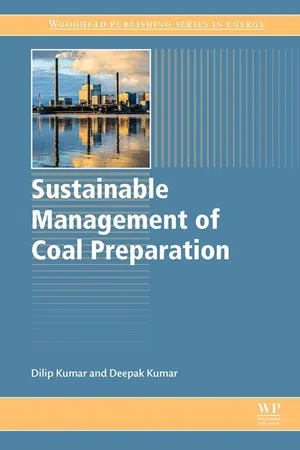
- 454 pages
- English
- ePUB (mobile friendly)
- Available on iOS & Android
Sustainable Management of Coal Preparation
About this book
Sustainable Management of Coal Preparation explains both the upstream and downstream of coal preparation, stressing clean coal technologies for coal utilization. It not only discusses the sustainability of coal preparation, but also considers the governance and management issues that come with fulfilling economic, social and environmental obligations of a sustainable mining operation. Divided in three parts, the book explains the preparation of coking and non-coking coal, clean technologies, the principles of sustainable management and emerging management issues. The inclusion of case studies also provides a practical perspective for the planning and design of coal preparation activities and environmental management.- Offers an integrated approach to pursue sustainable management between mining, coal preparation and final use of coal- Explains the economic aspects of coal preparation in a modern/developing society with zero-waste concept- Compiles the best technologies from around the world- Uses India, a developing country, as a case study to apply technologies where there is maximum potential for application and benefit
Frequently asked questions
- Essential is ideal for learners and professionals who enjoy exploring a wide range of subjects. Access the Essential Library with 800,000+ trusted titles and best-sellers across business, personal growth, and the humanities. Includes unlimited reading time and Standard Read Aloud voice.
- Complete: Perfect for advanced learners and researchers needing full, unrestricted access. Unlock 1.4M+ books across hundreds of subjects, including academic and specialized titles. The Complete Plan also includes advanced features like Premium Read Aloud and Research Assistant.
Please note we cannot support devices running on iOS 13 and Android 7 or earlier. Learn more about using the app.
Information
Introduction
Abstract
Keywords
1.1 The Objective

1.2 Preparation of Coking Coal
1.3 Preparation of Noncoking Coal

1.3.1 The New Policy
Table of contents
- Cover image
- Title page
- Table of Contents
- Copyright
- Dedication
- About the Authors
- Preface
- Acknowledgements
- Part I: General
- Part II: Case Studies
- Part III: Sustainable Management
- Appendix I. Locating a Central Washery – Economies of Scale
- Appendix II. The Role of PESTEL Analysis
- Index